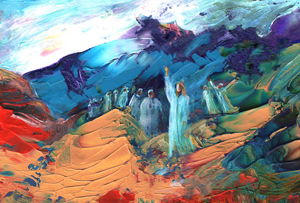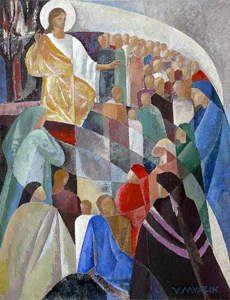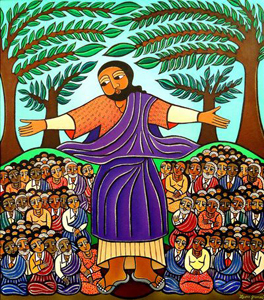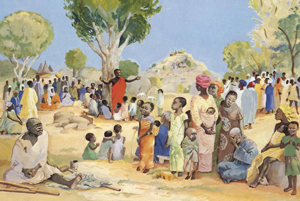For Sunday February 17, 2019
Lectionary Readings (Revised Common Lectionary, Year C)
Jeremiah 17:5-10
Psalm 1
1 Corinthians 15:12-20
Luke 6:17-26
Blessed are you who are poor, hungry, sad, and expendable. Woe to you who are rich, full, happy, and popular. This week’s Gospel in a nutshell. Boom.
Some context: As Luke tells the story, Jesus has just spent the night alone on a mountainside, praying before he chooses his twelve Apostles. As morning dawns, he and the newly called Twelve descend from the mountain to find a vast crowd waiting for them. The multitudes have come from everywhere, seeking help, and Jesus — in his element, with power literally pouring off of his garments — heals them all. Then, standing “on a level place” with the crowd, he tells his would-be disciples what discipleship actually looks like. Blessed are you who are poor, hungry, sad, and expendable. Woe to you who are rich, full, happy, and popular. Yup, that’s the fabulous Good News of the Kingdom of God. A world turned upside down. An economy of blessing that sounds ludicrous. A reordering of priority and privilege that the Church will find awkward and even offensive for centuries to come.
I’ll be honest: I don’t know what to do with this stinging lectionary. What I’m tempted to do, of course, is edit Jesus’s words to make myself feel better. As in, he didn’t really mean poor, did he? Homeless poor? Dressed-in-rags poor? Slum poor? Or hungry as in, literally hungry? Starving for bread? Also, he couldn’t possibly have meant sad people as in, people drowning in grief and despair. People who weep aloud in ways respectable folks never do in public. Wouldn't it be cruel to call them "blessed?" And surely he wasn’t referring to literal expendability. To those unlikeable, unpopular, unimportant people no one can blame me for avoiding. Obviously, Jesus was exaggerating. Speaking figuratively. Kidding. Right? I mean, come on! There must be some way I can wiggle out of the “woes” column and into the “blessed” column instead, right? Right?
 |
Wrong. Unlike Matthew, who softens things a bit by writing “poor in spirit,” instead of “poor,” and “those who hunger and thirst for righteousness,” instead of plain old “hungry,” Luke keeps Jesus’s “Sermon on the Plain” raw, terse, and close to the bone. There’s no way around it; as far as Luke’s Jesus is concerned, God’s favor does not rest on the well-fed, the well-off, and the well-liked. It rests on those who have absolutely nothing to fall back on but God. No credit line, no nest egg, no fan base, no immunity. Nothing. If you want to know where God’s heart is, Luke insists, look to the world’s most reviled, wretched, starving, grieving, shamed and desperate people. They are the fortunate ones. They are the blessed ones on whom God’s promise of more and better rests.
So. Okay. What am I to do with this reading? Wallow in guilt? Romanticize poverty? Avoid happiness? I don’t think so. The very fact that Jesus prefaces this hard teaching by alleviating suffering in every way possible suggests that he does not valorize misery for its own sake. Pain in and of itself is neither holy nor redemptive in the Christian story, and in fact, Jesus’s ministry is all about healing, abundance, liberation, and joy.
Also (look carefully), his Sermon on the Plain is not prescriptive. Nowhere in his litany of blessings and woes does Jesus tell his listeners how to behave. As Barbara Brown Taylor puts it, the sermon “is not advice at all. It is not even judgment. It is simply the truth about the way things work, pronounced by someone who loves everyone.”
 |
So, I ask the question again: What am I — cozy and comfortable as I am in my healthy, happy, First World, middle-class life — to do with this Gospel reading? How shall I reflect on it? Receive it? Sit with it?
I might begin by admitting that Jesus is right. That is to say, I might come clean about the fact that most of the time, I am not desperate for God. I am not keenly aware of God’s active, daily intervention in my life. I am not on my knees with need, ache, sorrow, longing, gratitude, or love. After all, why would I be? I have plenty to eat. I live in a comfortable home. I have both health and health insurance. My children are safe. I have access to a vibrant social, intellectual, and recreational life. I'm not in dire need of, well, anything.
In short, there isn’t much in my circumstances that leads me to a sense of urgency about ultimate things. I can go for days without talking to God. I can go days without thinking about God. It’s very, very easy — embarassingly easy — for all things deep and divine to become afterthoughts in my life, because God just isn't on my 24/7 radar. This isn’t because I’m callous. It’s because — as Jesus puts it so wisely in his searing sermon — I am already “full.” I have already “received my consolation.” I have easy access to laughter, so I don't wonder what lessons honest tears might yield. I am primed by my cozy life to live in the shallows, unaware of the treasures that lie waiting in the depths. Most of the time, it just plain doesn’t occur to me that I would be lost — utterly and wholly lost, physically and spiritually — without the grace that sustains me.
 |
I think what Jesus is saying in this Gospel is that I have something to learn about discipleship that my life circumstances will not teach me. Something to grasp about the beauty, glory, and freedom of the Christian life that I will never grasp until God becomes my everything, my all, my go-to, my starting place, and my ending place. Something to humbly admit about the limitations of my privilege. Something to recognize about the radical counter-intuitiveness of God’s priorities and promises. Something to notice about the obfuscating power of plenty to blind me to my own emptiness. Something to gain from the humility that says, "Those people I think I'm superior to in every way? They have everything to teach me. Maybe it's time to shut up and pay attention."
Is it comfortable to sit in the “woes” column? No. Might a willingness to do it anyway save my life? Yes.
In a beautful reflection on Jesus’s upside down kingdom, Frederick Buechner writes this: “The world says, ‘Mind your own business,’ and Jesus says, ‘There is no such thing as your own business.’ The world says, ‘Follow the wisest course and be a success,’ and Jesus says, ‘Follow me and be crucified.’ The world says, ‘Drive carefully — the life you save may be your own’ — and Jesus says, ‘Whoever would save his life will lose it, and whoever loses his life for my sake will find it.’ The world says, ‘Law and order,’ and Jesus says, ‘Love.’ The world says, ‘Get’ and Jesus says, ‘Give.’ In terms of the world's sanity, Jesus is crazy as a coot, and anybody who thinks he can follow him without being a little crazy too is laboring less under a cross than under a delusion."
 |
This is not prosperity theology. This is not “blessing” as health, wealth, and happiness. This is a teaching so costly, so soul-rattling, so unpalatable, that most of us will do anything to domesticate or ignore it.
Blessed are you who are poor, hungry, sad, and expendable. Why? Because you have everything to look forward to. Because the Kingdom of God is yours. Because God is the God of those who have nothing but him.
Lord, help me to hear what this is saying. Help me not to squirm away. Help me somehow to sit with woe, and learn the meaning of blessing.
Image credits: (1) Pixels.com; (2) Myazin.com; (3) Laura James Art Shop; and (4) Vanderbilt University Library.





